Dishing the dirt
David Hughes
THE BAD AND THE BEAUTIFUL by Sam Kashner and Jennifer Macnair Little, Broi4n, £20, pp. 380, ISBN 0316847380 Rarely do I feel a book too slight to review, yet I cannot pass up a very capable study — in this case of Hollywood in the 1950s — which has every right to exist, can hardly be faulted, but is only of fleeting interest, for a reason, possibly irrational, that needs a good look. Meanwhile don't doubt its readability, at an admirably superficial level.
The text covers, in well-arranged and crisp chapters, with a neat sense of irony, the last of Hollywood's golden ages distorted through the sleazy prism of Confidential, the magazine that dished the dirt on the stars and the studios, It is a good idea, yet in the result not an idea worth pursuing. The vulgarity of Confidential (nothing if not a magazine of bad manners', say the authors) somehow transfers itself with a nasty smack to this otherwise respectable narrative. It is as if Richard Desmond had bought up Sunset Boulevard. The feeling persists that what is needed, if you choose this absorbing subject, is a volume short of a masterpiece, but rather more than a gossip column, more serious, more seriously
funny, or funnily analytical, more analytically historical, more historically deep, than this entertaining account. I know: I am making the fatal error as a reviewer of not putting myself at the disposal of authorial intention. Give me a bad mark.
To get down to the content. It is in theory entirely riveting. I just wish it were between covers less prurient than these. The first chapter is called 'Wink, Titter and Flirt: Confidential magazine' and racily if not sexily tells us that the magazine's obsessions were race and sex. For example, Sammy Davis Jr was in scandalous trouble for getting anywhere near Ava Gardner. That's on the first page. Then we hear of the Lavender Closet, when the American tide turned in favour of exposing gays rather than reds. The magazine and this book are delighted when the police trap tennis star Bill Tinden interfering with boys. Noel Coward, whom Alexander Woolcott called 'destiny's tot', only just escapes censure when playing what he called 'Nescafe society' at Las Vegas in 1955. Yes, the book's packed with nice quotes which ought to be used in more telling contexts.
There's lots of poking around in `Splitsville (Sinatra's term for divorce). The sad sons of Chaplin and Edward G. Robinson are hounded to their fates. James Dean is plundered for what the book can get out of his tragedy, Rock Hudson oversweetly outed, Richard Burton given sniffy credit for breaking up nine marriages during 12 months in Hollywood. And yet it all sounds as innocent as documentary, fearlessly stating the facts, leaving the conclusions to us, nonetheless salaciously moral. When Victor Mature is allowed a joke of his own — having his hair curled for The Robe, he referred to his 'temporary permanent' — the heart lifts; then drops (making him look a little like Mr Clean in a dark wig') at a turn of the page. The film criticism, however, is decent and unremarkable.
No, I do quite like this book. I appreciate (patronisingly) its effort. Sketches abound of Laughton, von Stroheim, Burt Lancaster and the rest of the galaxy. But it remains far too close to, so distant from, its subject to be any real solid good. It's a source book; the two authors have done their stuff to help someone in the future do better, But if you savour Elizabeth Taylor saying on the set of Cleopatra that 'Richard Burton is the Frank Sinatra of Shakespeare'. or Robert Mitchum admitting that he belonged to 'the fraternity of the bottle', nothing I can say will prevent you from paying good money for it, or skimming it for the goods in bookshops where they let you browse.


























































 Previous page
Previous page